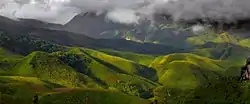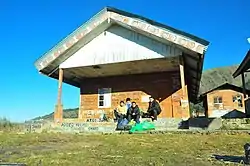| Dzükou Valley (Meitei: Dzuko Tampak[1][2][lower-alpha 1]) | |
|---|---|
 Dzükou Valley in Summer | |
| Floor elevation | 2,452 metres (8,000 ft) |
| Geography | |
| Location | Maram, Senapati district in Manipur[4] and Kohima district in Nagaland[5] |
| Coordinates | 25°33′12″N 94°04′01″E / 25.553329°N 94.067065°E |
| Rivers | Dzükou River |
The Dzüko Valley (Meitei: Dzuko Tampak[1][2][lower-alpha 1]), also known as Dzükou Valley or Dziiko Valley,[6] is a valley located in between Senapati district of Manipur and Kohima district of Nagaland in Northeast India.[7] This valley is well known for its natural environment, seasonal flowers and flora & fauna.[8][5]
It is situated at an altitude of 2,452 m (8,045 ft) above sea level. The valley is famous for its wide range of flowers in every season but the most famous one is the "Dzükou Lily" (Lilium chitrangadae), named after the mother of its discoverer, Hijam Bikramjit, a researcher of the Life Sciences Department, Manipur University, in the summer of 1991. This lily species is opined by some botanists to be similar to Shirui lily (Lilium mackliniae), with the only difference in being deeper in pink colour.[9][10]
Etymology
The term "Dzukou" is originated from a word common to both Angami and Mao languages, which can be translated as "cold water", with reference to the cold stream flowing throughout the valley area.[5][11]
Ecology
The valley borders a region of old-growth forest, and is home to several rare and endangered species of flora and fauna, including the Dzükou Lily and the Blyth's tragopan, which is the state bird of Nagaland. A number of other rare species are also found here, including several rhododendron species, plants such as the aconita nagaram, and fauna including the Asian golden cat, the Hollock Gibbon, the Dzukou Valley horned toad (Megophrys dzukou), several species of leopard including the clouded leopard, the Asiatic black bear, the capped langur, the stump-tailed macaque, and the serow.[12]
It has periodically been threatened by forest fires, which tend to spread quickly due to prevalent wind conditions and are difficult to fight because of the inaccessible terrain around the valley. In 2006, a forest fire destroyed 20 kilometers of forest in the valley before it was contained. The 2020–21 Dzükou Valley wildfires destroyed an estimated 200 acres of forest land, as well as significant flora in the valley itself.[13][14][15]
Gallery
- Dzüko Valley
 View of hillocks near Dzükou Valley from the guest house
View of hillocks near Dzükou Valley from the guest house Dzükou Valley Guest House—a courtesy of Government of Nagaland
Dzükou Valley Guest House—a courtesy of Government of Nagaland
See also
Notes
- 1 2 Meitei language (officially known as Manipuri language) is the official language of Manipur. Other regional languages of different places in Manipur may either be predominantly spoken or not in their respective places but "Meitei" is always officially used.[3]
References
- 1 2 "Why Should There Be A Separate Land Law For The Hills of Manipur? » Imphal Review of Arts and Politics". imphalreviews.in. 9 July 2022. Retrieved 23 March 2023.
There are many well-known valleys which make the hills like Khoupum Tampak, (Tampak means valley in Manipuri), Khuga Tampak, Sajik Tampak, Dzuko Tampak, Moreh and Jiribam beisdes other vast river basins like Barak River basin in the north.
- 1 2 Sharma, H. Surmangol (2006). "Learners' Manipuri-English dictionary". dsal.uchicago.edu (in Manipuri and English). University of Chicago. p. 75. Retrieved 23 March 2023.
tampāk ꯇꯝꯄꯥꯛ /təm.pak/ n. valley. Morph: tam‑pāk [valley‑to be broad].
- ↑ "Report of the Commissioner for linguistic minorities: 47th report (July 2008 to June 2010)" (PDF). Commissioner for Linguistic Minorities, Ministry of Minority Affairs, Government of India. p. 78. Archived from the original (PDF) on 13 May 2012. Retrieved 16 February 2012.
- ↑ Singh, Arambam Sanatomba (18 June 2021). Ecotourism Development Ventures in Manipur: Green Skill Development and Livelihood Mission. Walnut Publication. p. 117. ISBN 978-93-91145-59-0.
Dzuko Valley: The Dzuko Valley is located in the Senapati district at the borders of the States of Nagaland and Manipur in the North East India.
- 1 2 3 Doon, Vikas; Team, Dino Editorial. North East GK Complete. Dinosaur Books. p. 26.
The Dzukou Valley is in Senapati district bordering with Kohima. There are seasonal flowers and a number of flora and fauna. Dzukou derives its meaning from the Angami/Mao word that translates to "Cold Water", referring to the cold stream that flows through the valley. It is at an altitude of 2,438 metres (7,999 ft) above sea level, behind the Japfu Peak in Nagaland. The rare Dziikou lily is found only in this valley.
- ↑ Mao, Ashiho Asosii; Gogoi, Rajib (2016). Flora of Dziiko/Dzukou Valley. Botanical Survey of India. ISBN 978-81-8177-076-9.
- ↑ —Chauhan, Compiled by Anita (2014). Conserving Asia's Wildlife Treasure: The Pheasants. PartridgeIndia. p. 329. ISBN 978-1-4828-2131-4.
... In the year 2000, a trekking expedition to the Dzukou valley on the Manipur—Nagaland border, found a pair of Blyth's tragopan killed by a ...
—Nimai, R. K. (10 July 2019). NE Scholar : Emerging The Lost Civilization of The Manipur Valley. NE Brothers Pvt Limited. p. 40.The Dzükou/Dzüko Valley is a valley located at the border of the states of Manipur and Nagaland in northeast India. This valley is well known for its natural environment, seasonal flowers and flora and fauna.
—Tlau, Thara (9 June 2015). Diamantaire. Partridge Publishing. p. 111. ISBN 978-1-4828-4955-4.... treacherous but beautiful Dzuko Valley on the border of Manipur and Nagaland states.'
—Singh, Arambam Sanatomba (18 June 2021). Ecotourism Development Ventures in Manipur: Green Skill Development and Livelihood Mission. Walnut Publication. p. 117. ISBN 978-93-91145-59-0.Dzuko Valley: The Dzuko Valley is located in the Senapati district at the borders of the States of Nagaland and Manipur in the North East India.
—Rastogi, Priyanka (13 May 2019). Early Sunrise, Early Sunset: Tales of a Solo Woman Traveler Across North East and East India. Partridge Publishing. p. 149. ISBN 978-1-5437-0523-2.Dzukou valley can be reached via Zakhama or Viswema, and is around 23 kms from Kohima; situated between the states of Nagaland and Manipur, ...
{{cite book}}: CS1 maint: date and year (link)
—Manocha, Sanjay (8 May 2018). Honey, I am Back…: And 4 Other Soulful Stories. Notion Press. p. 99. ISBN 978-1-64324-180-7.... Dzukou Valley, located on the border of the states of Nagaland and Manipur in North-East India.
- ↑ Nimai, R. K. (10 July 2019). NE Scholar : Emerging The Lost Civilization of The Manipur Valley. NE Brothers Pvt Limited. p. 40.
The Dzükou/Dzüko Valley is a valley located at the border of the states of Manipur and Nagaland in northeast India. This valley is well known for its natural environment, seasonal flowers and flora and fauna.
- ↑ "Dzuko Lily - Flowers of India". Flowers of India. Retrieved 14 August 2020.
The endemic Dzukou lily was first identified, in the Dzukou valley, by Hijam Bikramjit of the Life Sciences Department, Manipur University, in the summer of 1991. Bikramjit was part of a Manipur Cultural Integration Conference team that trekked to the valley that summer. Bikramjit named it Lilium chitrangadae after his mother. However, later studies found that Dzuko lily is botanically similar to the revered Shirui lily, but is deep pink in color.
- ↑ "Lilium mackliniae - Shirui Lily". www.flowersofindia.net. Retrieved 23 March 2023.
- ↑ Rastogi, Priyanka (13 May 2019). Early Sunrise, Early Sunset: Tales of a Solo Woman Traveler Across North East and East India. Partridge Publishing. p. 149. ISBN 978-1-5437-0523-2.
Dzukou means 'Cold Water' in Angami/Mao language, and it got its name due to the cold-water stream flowing in the region.
- ↑ "The rolling ashes from Dzukou hills write back". Mintlounge. 21 February 2021. Retrieved 16 March 2021.
- ↑ "NDRF deploys more teams, choppers as Dzukou Valley wildfire rages on". Zee News. 2 January 2021. Retrieved 5 January 2021.
- ↑ "Massive wildfire engulfs large parts of Dzuko valley on Nagaland-Manipur border". The Indian Express. 1 January 2021. Retrieved 5 January 2021.
- ↑ "Dzukou Valley is turning into a 'plastic free zone' on World Environment Day". The Times of India. Retrieved 5 January 2021.
External links
 Media related to Dzüko Valley (category) at Wikimedia Commons
Media related to Dzüko Valley (category) at Wikimedia Commons